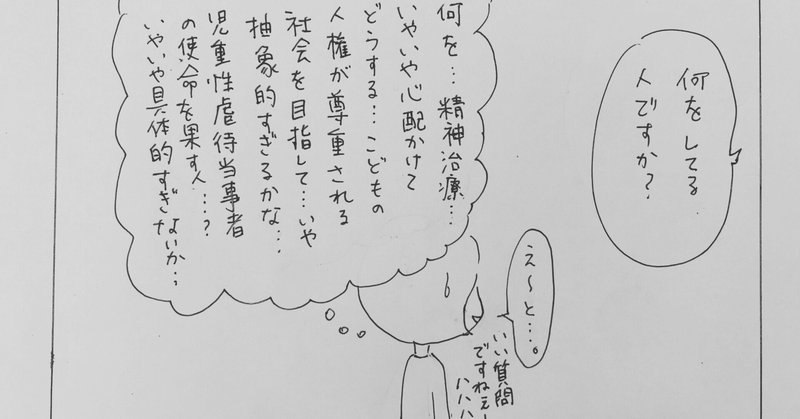
「何をしている人ですか?」児童性虐待当事者のジレンマ
「何をしている人ですか?」と聞かれると毎回、困る。
仕事ができないほど精神がすり減っているので、精神治療を続けているけど、心配されるのも怠い。人の前では元気な自分を演出しているから、混乱を招くだけだろう。
収入にはまだつながっていないけど、こうやって自分の経験や考えを発信するということは不定期に続けている。
ただそのテーマを他人に話すことに抵抗感がある。「児童虐待」の中でも身内による「性虐待」がテーマだからだ。
更に言うと、「加害者」に関心がある。
性犯罪の問題は、性被害者側にあるのではなく加害者にあり、
更に性加害に無意識的に加担している社会にいる一人ひとりにも責任があると思っているからだ。
加害者も幼少期に児童虐待を受けている傾向が顕著で、
それは、子どもを無責任に作る人たちが多すぎるほどに性教育が遅れている社会問題から始まり、
性犯罪そのものである猥褻媒体が蔓延っていて、
加害者が捕まっても更生がされないまま再び社会に戻されるという、
性犯罪者増産システムの中で、私たちは笑顔で生きることを強いられているからだ。
被害者は一度でも性被害に遭えば一生、人生を狂わされるほどの損害があるのに、
加害者は数年服役しただけで、社会に復帰できてしまう。
被害者に厳しく、加害者に甘い世の中......と言いたいところだが、そんなに簡単でもない。
その加害者も元々は被害者で、誰にも助けれもらえずに症状が悪化して加害を繰り返してしまうなら、
加害行為には甘く、被害者の心のケアには無頓着という社会の脆弱性が浮き彫りになってくる。
生粋な性被害者(まだ加害を犯していない)の声は少しづつ、聞こえてきているが、
加害者にまで悪化してしまった性被害者の声はまだまだ聞こえづらい。
それは、加害者になってしまった途端、犯罪行為の原因になった被害経験は、犯罪の言い訳に聞こえてしまうからというジレンマもある。
でも、被害者だったからと言って、加害者としての罪が軽くなる訳ではない、ということはあまりにも理解されていない。
軽くなるどころか、社会全体の罪が重くなる一方なのだ。
子どもを作る行為・育てるリスクを子供達に伝えない教育方針、「孫の顔が早く見たい」と本人の意思を無視し我が子にプレッシャーをかける親族、性教育がまともに受けられていない子供たちの目につく場所に猥褻媒体が蔓延している状況、、、言い始めたらキリがない。
こういう無意識的に続けていることが、性犯罪につながっているということがわかっていない人が多すぎる。
被害者と加害者を分けて考えることで、第三者は無関係であるという思考停止。実はこういうこの思考停止自体が性犯罪に加担している。
なんで無意識が悲劇に繋がるのに、なぜ反省しないのかというと、信じていたことを一旦、疑ってみたり、自分の行動や思考を変えなくてはならなくなるかもしれないからだ。
無意識で空元気な社会の中で、自分だけ暗い現実を見つめて、意識的に変化を続けていかなくのは時には孤独で絶望的。生きづらさと向き合う根性が必要。難しいことはしたくないのは人間の本能でもあると思うから仕方ないと言えば仕方ない。
それなら、私はなぜ難しい道を歩んでいるのかというと、人間のもう一つの本能に影響されているからだろう。
自分に起きた悲惨なことが、今もこれからも他の子供に続くと想像すると居た堪れないから。状況が改善されることを願って変化を試さないと生きる意味がわからなくなるから。
当事者でない第三者が性犯罪を自分ごととして意識するのは難しいと思うが、逆に私が365日、性犯罪のことを考えるのは、やらずにはいられないこと。
考えたくなくても、考えてしまう。人と何気ない話をしていても、道を歩いていても、本を読んでも、テレビを見ても、寝ていても、無意識的に考えてしまう。辛かったとしても、難しいことではない。
私はそんな人間です。性犯罪がなくなるにはどういう変化をすればいいか常に考えて実践している人です。
初対面の人や不特定多数の人に簡単に答えられる質問ではないのですが、文字に起こす方が楽なので、挑戦してみました。
A Journey of Advocacy: Confronting the Complexities of Child Sexual Abuse(英文)
When asked, "What do you do?" I always struggle to answer. My mental state has deteriorated to the point where work and everyday chores become challenging, and while I continue therapy, it's exhausting to deal with others' concerns. I put on a cheerful facade in public, which only leads to confusion.
Despite not yet translating into income, I sporadically share my experiences and thoughts in this manner. However, I feel a reluctance to discuss this topic with others because it revolves around "child sexual abuse," particularly within families.
Additionally, I'm intrigued by the "perpetrators." I believe sexual crimes are not just about victims but also about the responsibility of those who commit them. Moreover, I think everyone in society who unconsciously contributes to sexual abuse bears a responsibility.
Perpetrators often have a history of childhood abuse, stemming from societal issues like delayed sexual education due to irresponsible parents, the prevalence of pornographic material, and a system that fails to rehabilitate perpetrators, releasing them back into society.
While victims suffer lifelong damage from even one instance of sexual abuse, perpetrators can reintegrate into society after serving only a few years in prison. It's a world that is harsh on victims and lenient on perpetrators, though it's not that simple.
Many perpetrators were once victims themselves, their conditions worsening without help until they become perpetrators. This reveals a societal vulnerability where we are lenient towards perpetrators but indifferent towards the mental well-being of victims.
The voices of genuine sexual abuse victims (those who have not yet offended) are gradually being heard, but those of victims who have turned into perpetrators remain largely unheard. There's a dilemma where the experiences that turned them into perpetrators can be seen as excuses for their crimes.
However, being a victim does not diminish the culpability of becoming a perpetrator. This understanding is often lacking, leading to increased societal culpability.
The education system fails to convey the risks of having and raising children, relatives pressure their own children ignoring their desires, and pornographic material is easily accessible to anyone. The list goes on.
Many people are unaware that their unconscious actions contribute to sexual crimes. The thought process that separates victims from perpetrators and considers third parties as irrelevant actually aids sexual crimes.
Why don't we reflect on this unconscious contribution to tragedy? Because questioning beliefs and changing behavior can be daunting.
Facing the bleak reality consciously amidst an unconsciously cheerful society can be lonely and despairing. It takes courage to confront this difficulty, and it's natural to avoid challenging tasks.
Yet, I walk this difficult path because another human instinct drives me. Imagining that the tragedies I've faced might continue for other children is unbearable. I need to believe in change to find meaning in life.
It might be challenging for outsiders to relate to sexual crimes on a personal level, but for me, thinking about it is unavoidable. It permeates every aspect of my life, from casual conversations to everyday activities, constantly on my mind, even when it's painful.
That's who I am—a person who constantly thinks about and practices changes to eradicate sexual crimes. It's not an easy question to answer for strangers or a large audience, but I found it easier to articulate in writing, so I gave it a try.
ありがとうございます^^励みになります。
